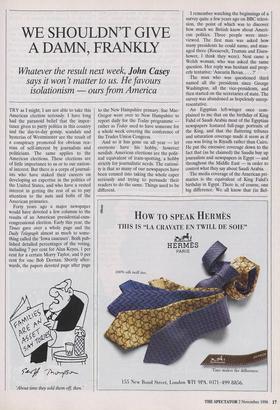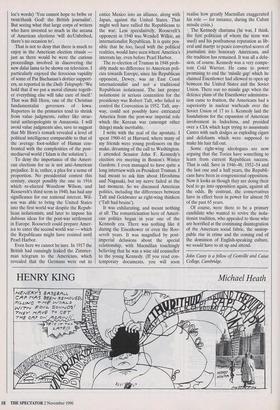WE SHOULDN'T GIVE A DAMN, FRANKLY
Whatever the result next week, John Casey
says it won't matter to us. He favours isolationism — ours from America
TRY as I might, I am not able to take this American election seriously. I have long had the paranoid belief that the impor- tance given to party politics in this country and the day-to-day gossip, scandals and hysterias of Westminster are the result of a conspiracy promoted for obvious rea- sons of self-interest by journalists and politicians. The same applies to the American elections. These elections are of little importance to us or to our nation- al interest. But there is a corps of journal- ists who have staked their careers on developing an expertise in the politics of the United States, and who have a vested interest in getting the rest of us to pay attention to the nuts and bolts of the American primaries.
Forty years ago a major newspaper would have devoted a few columns to the results of an American presidential-cum- congressional election. Early this year, the Times gave over a whole page and the Daily Telegraph almost as much to some- thing called the 'Iowa caucuses'. Both pub- lished detailed percentages of the voting, including 7 per cent for Alan Keyes, 1 per cent for a certain Morry Taylor, and 0 per cent for one Bob Dornan. Shortly after- wards, the papers devoted page after page `About time they sold them off, then.' to the New Hampshire primary. Sue Mac- Gregor went over to New Hampshire to report daily for the Today programme rather as Today used to have someone for a whole week covering the conference of the Trades Union Congress.
And so it has gone on all year — let everyone have his hobby, however nerdish. American elections are the polit- ical equivalent of train-spotting, a hobby strictly for journalistic nerds. The curiosi- ty is that so many of our newspapers have been conned into taking the whole caper seriously and trying to persuade their readers to do the same. Things used to be different. I remember watching the beginnings of a survey quite a few years ago on BBC televi- sion, the point of which was to discover how much we British knew about Ameri- can politics. Three people were inter- viewed. The first man was asked how many presidents he could name, and man- aged three (Roosevelt, Truman and Eisen- hower, I think they were). Next came a Welsh woman, who was asked the same question. Her reply was hesitant and prop- erly tentative: ‘Aneurin Bevan.. . . ?'
The man who was questioned third named all the presidents since George Washington, all the vice-presidents, and then started on the secretaries of state. The survey was abandoned as hopelessly unrep- resentative.
An Egyptian left-winger once com- plained to me that on the birthday of King Fand of Saudi Arabia most of the Egyptian newspapers featured full-page portraits of the King, and that the flattering tributes and saturation coverage made it seem as if one was living in Riyadh rather than. Cairo. He put the excessive coverage down to the fact that (as he claimed) the Saudis buy up journalists and newspapers in Egypt — and throughout the Middle East — in order to control what they say about Saudi Arabia.
The media coverage of the American pri- maries is the equivalent of King Fand's birthday in Egypt. There is, of course, one big difference. We all know that (in Bel- loc's words) 'You cannot hope to bribe or twist/thank God! the British journalist'. But seeing what that large corps of writers who have invested so much in the arcana of American elections 'will do/Unbribed, there's no occasion to'.
That is not to deny that there is much to enjoy in the American election rituals just as there would be were the curious proceedings involved in discovering the new dalai lama to be shown on television. I particularly enjoyed the ferocious vapidity of some of Pat Buchanan's dottier support- ers, as reported in the Daily Telegraph: 'We hold that if we put a moral climate togeth- er everything else will take care of itself.' That was Bill Horn, one of the Christian fundamentalist governors of Iowa. Reporters in the primaries tend to shrink from value judgments, rather like struc- tural anthropologists in Amazonia. I will avoid value judgments also, save to suggest that Mr Horn's remark revealed a level of political intelligence comparable to that of the average foot-soldier of Hamas con- fronted with the complexities of the post- mediaeval world (Islam is the solution').
To deny the importance of the Ameri- can elections for us is not anti-American prejudice. It is, rather, a plea for a sense of proportion. No presidential contest this century, except possibly the one in 1916 which re-elected Woodrow Wilson, and Roosevelt's third term in 1940, has had any significance for our national interest. Wil- son was able to bring the United States into the first world war despite the Repub- lican isolationists, and later to impose his dubious ideas for the post-war settlement in Europe. Roosevelt could prepare Amer- ica to enter the second world war — which the Republicans might have resisted until Pearl Harbor.
Even here we cannot be sure. In 1917 the British had cunningly leaked the Zimmer- man telegram to the Americans, which revealed that the Germans were out to entice Mexico into an alliance, along with Japan, against the United States. That might well have rallied the Republicans to the war. Less speculatively, Roosevelt's opponent in 1940 was Wendell Wilkie, an internationalist Republican. It is quite pos- sible that he too, faced with the political realities, would have seen where America's interests lay, even before Pearl Harbor.
The re-election of Truman in 1948 prob- ably made no difference to American poli- cies towards Europe, since his Republican opponent, Dewey, was an East Coast internationalist and not a traditional Republican isolationist. The last proper isolationist in serious contention for the presidency was Robert Taft, who failed to control the Convention in 1952. Taft, any- way, could not possibly have extricated America from the post-war imperial role which the Korean war (amongst other things) made inevitable.
I write with the zeal of the apostate. I spent 1960-61 at Harvard, where many of my friends were young professors on the make, dreaming of the call to Washington. I attended Senator John F. Kennedy's election eve meeting in Boston's Winter Gardens. I even managed to have quite a long interview with ex-President Truman. I had meant to ask him about Hiroshima and Nagasaki, but my nerve failed at the last moment. So we discussed American politics, including the differences between Taft and Goldwater as right-wing thinkers (`Taft had brains').
It was exhilarating, and meant nothing at all. The romanticisation here of Ameri- can politics began in year one of the Kennedy era. There was nothing like it during the Eisenhower or even the Roo- sevelt years. It was magnified by post- imperial delusions about the special relationship, with Macmillan touchingly believing that he was a wise old counsellor to the young Kennedy. (If you read con- temporary documents, you will soon realise how greatly Macmillan exaggerated his role — for instance, during the Cuban missile crisis.) The Kennedy charisma (he was, I think, the first politician of whom the term was used) and his posthumous reputation as lib- eral and martyr to peace converted scores of journalists into honorary Americans, and the tradition has remained. It was all a delu- sion, of course. Kennedy was a very compe- tent Cold Warrior. He came to power promising to end the 'missile gap' which he claimed Eisenhower had allowed to open up between the United States and the Soviet Union. There was no missile gap: when the defence plans of the Eisenhower administra- tion came to fruition, the Americans had a superiority in nuclear warheads over the Soviet Union of 17 to 1. Kennedy laid the foundations for the expansion of American involvement in Indochina, and presided over a CIA which kept trying to assassinate Castro with such dodges as exploding cigars and defoliants which were supposed to make his hair fall out.
Some right-wing ideologues are now arguing that the Tories have something to learn from current Republican success. That is odd. Save in 1946-48, 1952-54 and the last one and a half years, the Republi- cans have been in congressional opposition. Now it looks as though they are doing their best to go into opposition again, against all the odds. By contrast, the conservatives have in effect been in power for almost 50 of the past 65 years.
Of course, were there to be a primary candidate who wanted to revive the isola- tionist tradition, who appealed to those who are horrified at the continuing disintegration of the American social fabric, the unstop- pable rise in crime and the coming end of the dominion of English-speaking culture, we would have to sit up and attend.
John Casey is a fellow of Gonville and Calms College, Cambridge.



















































































 Previous page
Previous page